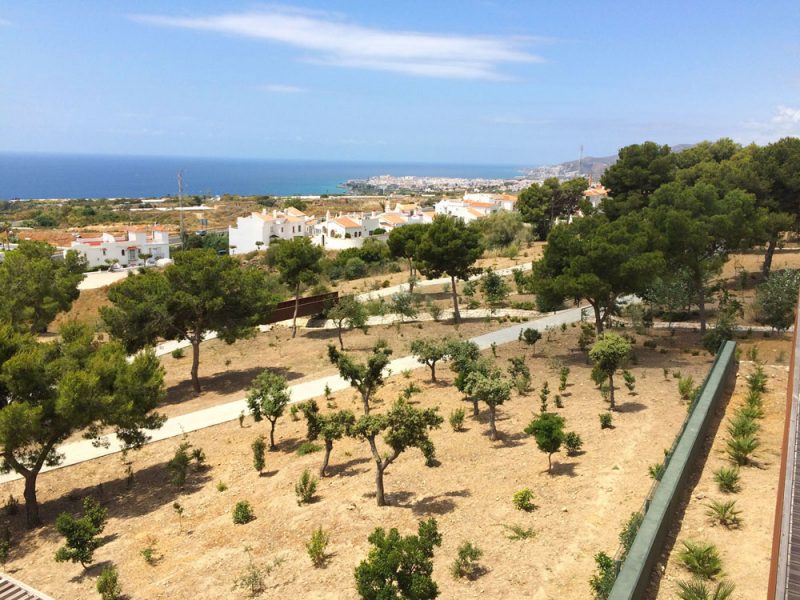Detunda Cueva de Nerja, RAJBEN. Spain
- Name: JB Detunda_Cueva de Nerja
- Address: Monte Público MA-30017-AY "Pinar y Dehesa del Rio Chillar", Nerja, 29780-Málaga. (SPAIN)
Access Autovía del Mediterráneo (A-7; E-15) (exit km 295).
parking is shared with La Cueva Fundation located in Maro district, Nerja.
- Website: http://www.juntadeandalucia.es/medioambiente/site/portalweb/menuitem.7e1cf46ddf59bb227a9ebe205510e1ca/?vgnextoid=75eda2e4d0bd9510VgnVCM2000000624e50aRCRD&vgnextchannel=51b666edf6e77310VgnVCM2000000624e50aRCRD
- Email: jbotanico.cuevanerja.cmaot@juntadeandalucia.es
- Opening hours: Tuesday to Sunday from 9:00 a.m. to 15:00 p.m. Closed: December 24, 25 and 31.
- Director: Ministry of the Environment and Territorial Planning (CMAOT): Carmen Rodriguez Hiraldo
- Facilities:
Herbarium;Arboretum;Seed Bank;Published Plant Catalogue;Computer Plant Record System;Sponsorship Programmes;Shop;Cafeteria;Laboratories;disabled access selected
- Number of Species:
400
- Opened in Year: June 27th, 2017
- Conservation programmes: Location and monitoring of protected, endangered, endemic and rare flora and fungi taxa present in the Andalusian territory.
• Collection of seeds and other propagules, from the taxa that are the object of work, destined to:
- Development of germination and establishment protocols.
- Representation in the different botanical gardens and Mycological.
- Conservation in the Andalusian Plant Germplasm Bank
- Actions of reintroduction or population reinforcement in the middle.
• Representation of vegetation, flora and mycoflora that characterize the various Andalusian biogeographical sectors.
• Maintenance of conservation collections and genetic rescues
• Participation in the development of the Recovery Plans approved by the Ministry of Environment and Territory Planning, in this case, of two of the four currently approved plans: High Summits and Dunes, Arenales and Coastal Cliffs - Research Programs:
• Collaboration with research centers, such as the CSIC, and universities, both regional and national, for the study of protected and threatened taxa present in the Andalusian community. The collections of botanical and mycological gardens are a tool for the development of scientific studies, since they offer genetic material from very remote locations in nature and group in a single place species with which to investigate in a more effective way. Research centers such as the CSIC, other Botanical Gardens, private Foundations, Companies and different Universities, rely on the equipment and means offered by the Network for the development of projects framed in different subjects, among which some studies related to pests stand out , effect of herbivory, tests with special substrates or the monitoring of invasive alien species.
• Collaboration with the Spanish Society of Biology of Plant Conservation (SEBICOP), in the SEFA Project (Monitoring of Threatened Flora Species and Special Protection in Spain). Consisting of the study on the status of 70 species of the annexes of the Habitats Directive, the Spanish Catalog or the LESPRE.
• Permanent member of the Iberomacaronésica Association of Botanical Gardens. - Education Programmes:
We can highline the following education programmes:
• Aldea Program, a program carry out with the collaborationof the Ministry of Education. The main objectives are the promotion of integrated development of education initiatives for the natural resources preservation and of sustainable development within the Andalusian educational community, in order to contribute to a more pro-environmental approach, fair and supportive society, allowing the achievement of an integral education, which shares and is based on the four educational pillars that UNESCO proposes: Learning to be / Learning to live together / Learning to know / Learning to do.
• Training courses for professional sectors that require technical training in the field of flora threatened and of interest.
• Activities and workshops with different themes and levels aimed at all types of public as a way to approach the Andalusian floristic values: photography workshops, traditional uses of plants, knowledge of certain plant groups, etc.
• Guided visits to know the contents of the different botanical gardens.
• Permanent workshops with groups that can observe the dynamics of the gardens at different times of the year.
Country: Spain

